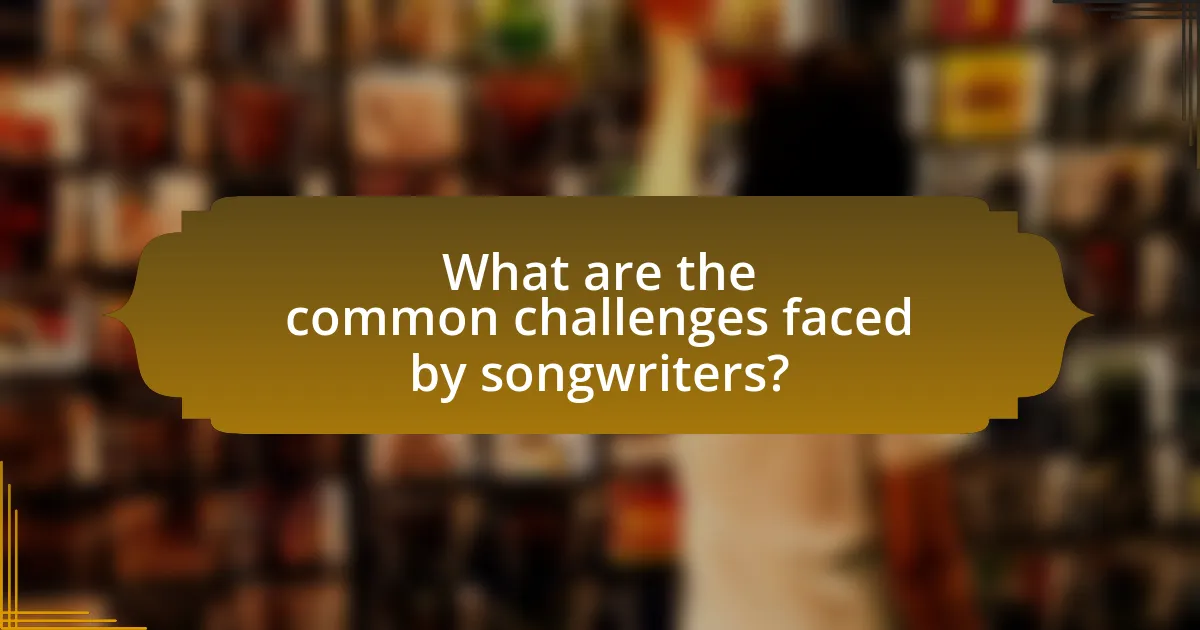The article “Analyzing the Lyrics: What Makes a Great Songwriter?” explores the defining characteristics of exceptional songwriters, emphasizing their ability to create compelling narratives and evoke emotions through lyrics. It examines the significance of emotional authenticity, storytelling techniques, and the impact of personal experiences on songwriting. Additionally, the article discusses the role of collaboration, feedback, and various songwriting techniques, including the importance of structure, rhyme, and rhythm. Common challenges faced by songwriters, such as writer’s block and the pressure of commercial expectations, are also addressed, along with practical tips and resources for aspiring songwriters to enhance their craft.

What defines a great songwriter?
A great songwriter is defined by their ability to craft compelling narratives and evoke emotions through lyrics. This skill involves a deep understanding of language, rhythm, and melody, allowing them to connect with listeners on a personal level. For instance, Bob Dylan’s use of vivid imagery and storytelling in songs like “Blowin’ in the Wind” showcases how effective lyrics can resonate with social movements and personal experiences. Additionally, great songwriters often demonstrate versatility across genres, as seen in the works of artists like Taylor Swift, who seamlessly transitions from country to pop while maintaining lyrical depth. This combination of narrative skill, emotional resonance, and versatility is what distinguishes great songwriters in the music industry.
How do lyrics contribute to a song’s overall impact?
Lyrics significantly contribute to a song’s overall impact by conveying emotions, telling stories, and connecting with listeners on a personal level. The choice of words, themes, and imagery in lyrics can evoke specific feelings, making the song relatable and memorable. For instance, songs like “Hallelujah” by Leonard Cohen utilize poignant lyrics that explore themes of love and loss, resonating deeply with audiences. Research indicates that songs with relatable lyrics can enhance listener engagement and emotional response, as demonstrated in studies published in the Journal of Experimental Psychology, which found that emotionally charged lyrics can lead to stronger connections with the music. Thus, the effectiveness of lyrics in a song is crucial for its emotional and cultural resonance.
What elements of lyrics resonate with listeners?
Emotional authenticity is a key element of lyrics that resonates with listeners. When songwriters convey genuine feelings and experiences, it creates a connection that listeners can relate to, often leading to a deeper emotional response. For instance, studies have shown that lyrics expressing vulnerability or personal struggles can evoke empathy and reflection in audiences, enhancing their overall listening experience. Additionally, relatable themes such as love, loss, and resilience are frequently found in successful songs, further solidifying their impact on listeners.
How do storytelling techniques enhance songwriting?
Storytelling techniques enhance songwriting by creating emotional depth and relatability in lyrics. When songwriters employ narrative elements such as character development, conflict, and resolution, they engage listeners on a personal level, making the song’s message more impactful. For instance, songs like “The River” by Bruce Springsteen illustrate a character’s journey, evoking empathy and connection through vivid imagery and relatable experiences. This approach not only captivates the audience but also fosters a memorable listening experience, as evidenced by the enduring popularity of storytelling songs across various genres.
Why is emotional authenticity important in songwriting?
Emotional authenticity is important in songwriting because it fosters a genuine connection between the artist and the audience. When songwriters express their true feelings and experiences, listeners are more likely to resonate with the music, leading to a deeper emotional impact. Research indicates that songs with authentic emotional expression are often more memorable and relatable, enhancing the listener’s engagement. For instance, a study published in the Journal of Personality and Social Psychology found that music perceived as authentic can evoke stronger emotional responses, reinforcing the idea that authenticity in lyrics is crucial for creating impactful songs.
How can songwriters convey genuine emotions through lyrics?
Songwriters can convey genuine emotions through lyrics by using personal experiences and vivid imagery. By drawing from their own life events, songwriters create relatable narratives that resonate with listeners. For instance, the use of specific details, such as sensory descriptions and emotional triggers, enhances the authenticity of the lyrics. Research indicates that songs with personal storytelling elements, like those by artists such as Taylor Swift and Ed Sheeran, often connect more deeply with audiences, as they evoke empathy and shared feelings. This connection is further supported by studies showing that emotionally charged lyrics can lead to increased listener engagement and emotional responses, validating the effectiveness of this approach in songwriting.
What role does personal experience play in songwriting?
Personal experience is fundamental in songwriting as it provides authenticity and emotional depth to the lyrics. Songwriters often draw from their own life events, feelings, and relationships, which allows them to create relatable and impactful narratives. For instance, artists like Taylor Swift and Ed Sheeran have openly discussed how their personal experiences shape their music, resulting in songs that resonate deeply with listeners. This connection between personal experience and songwriting is supported by research indicating that autobiographical elements in lyrics enhance listener engagement and emotional response.
What techniques do great songwriters use to craft memorable lyrics?
Great songwriters use techniques such as storytelling, emotional resonance, and vivid imagery to craft memorable lyrics. Storytelling allows songwriters to create a narrative that listeners can connect with, making the song relatable and engaging. Emotional resonance is achieved through the use of personal experiences and universal themes, which evoke feelings that resonate with the audience. Vivid imagery employs descriptive language that paints a picture in the listener’s mind, enhancing the overall impact of the lyrics. These techniques are supported by the fact that songs with strong narratives and emotional depth often achieve higher chart success and listener retention, as evidenced by studies on popular music trends.
How does rhyme and rhythm influence lyric writing?
Rhyme and rhythm significantly influence lyric writing by enhancing memorability and emotional impact. Rhyme creates a musical quality that makes lyrics easier to remember and sing along to, which is crucial in popular music. For instance, songs with consistent rhyme schemes, such as ABAB or AABB, often resonate more with listeners, as seen in classic hits like “Twinkle, Twinkle, Little Star.” Rhythm, on the other hand, dictates the flow and pacing of the lyrics, allowing songwriters to convey emotions effectively. A strong rhythmic structure can evoke feelings of urgency or calmness, as demonstrated in genres like hip-hop, where rhythm is essential for delivering complex lyrical content. Together, rhyme and rhythm form the backbone of effective lyric writing, making songs engaging and impactful.
What are the common structures found in successful songs?
Successful songs commonly follow structures such as verse-chorus form, AABA structure, and verse-verse-chorus format. The verse-chorus form, which alternates between verses and a repeated chorus, is prevalent in pop music, allowing for storytelling and emotional impact while maintaining listener engagement. The AABA structure, often found in classic standards, consists of two contrasting sections followed by a return to the initial theme, providing a sense of resolution. Additionally, the verse-verse-chorus format emphasizes lyrical development before reaching the main hook, enhancing the song’s narrative flow. These structures are supported by numerous hit songs across genres, demonstrating their effectiveness in creating memorable and impactful music.

How do great songwriters develop their craft?
Great songwriters develop their craft through consistent practice, collaboration, and studying various musical styles. They often write daily, honing their skills and experimenting with different lyrical structures and melodies. Collaboration with other musicians exposes them to diverse perspectives and techniques, enhancing their songwriting abilities. Additionally, analyzing the works of influential songwriters allows them to understand effective storytelling and emotional resonance in lyrics. Research indicates that songwriters who engage in regular feedback loops and workshops significantly improve their craft, as seen in studies by the Berklee College of Music, which highlight the importance of peer review in artistic development.
What practices can aspiring songwriters adopt to improve their skills?
Aspiring songwriters can improve their skills by consistently writing songs, studying successful song structures, and collaborating with other musicians. Regular songwriting practice helps develop creativity and refine lyrical skills, while analyzing hit songs reveals effective techniques and common themes. Collaboration fosters new ideas and perspectives, enhancing the overall songwriting process. Research indicates that musicians who engage in regular practice and collaboration tend to show significant improvement in their craft, as highlighted in studies on musical skill development.
How important is collaboration in the songwriting process?
Collaboration is crucial in the songwriting process as it enhances creativity and brings diverse perspectives. When songwriters work together, they can combine their unique skills and experiences, leading to richer and more innovative compositions. Research indicates that collaborative songwriting often results in higher-quality music, as seen in successful partnerships like Lennon and McCartney, who produced numerous iconic songs by leveraging their complementary strengths. This synergy not only fosters creativity but also helps in overcoming creative blocks, making collaboration a vital component in crafting memorable songs.
What role does feedback play in refining lyrics?
Feedback plays a crucial role in refining lyrics by providing external perspectives that enhance clarity, emotional impact, and overall quality. When songwriters receive feedback from peers, producers, or audiences, they gain insights into how their lyrics resonate, allowing them to identify areas for improvement. For instance, constructive criticism can highlight ambiguous phrases or suggest more relatable imagery, leading to revisions that strengthen the song’s message. Research indicates that collaborative songwriting, which often involves feedback, results in higher-quality lyrics, as seen in successful songwriting teams like Lennon-McCartney, who frequently relied on each other’s input to elevate their work.
Why is studying other songwriters beneficial?
Studying other songwriters is beneficial because it enhances one’s understanding of songwriting techniques and lyrical composition. By analyzing the work of established songwriters, individuals can identify effective structures, themes, and emotional expressions that resonate with audiences. Research indicates that exposure to diverse songwriting styles can improve creativity and inspire new ideas, as seen in studies highlighting the correlation between artistic collaboration and innovation in music. Additionally, understanding the historical context and influences behind successful songs can provide valuable insights into the craft, ultimately leading to the development of a unique songwriting voice.
What can be learned from analyzing classic songs?
Analyzing classic songs reveals insights into cultural, emotional, and lyrical craftsmanship. Classic songs often reflect the societal values and historical contexts of their time, providing a lens through which listeners can understand past experiences and sentiments. For example, Bob Dylan’s “The Times They Are a-Changin’” captures the spirit of social change in the 1960s, illustrating how music can serve as a commentary on political movements. Additionally, examining the structure and word choice in classic songs can highlight the techniques that contribute to effective songwriting, such as metaphor, rhyme schemes, and narrative storytelling. This analysis can inform contemporary songwriters about the elements that resonate with audiences, enhancing their own creative processes.
How can songwriters find inspiration from various genres?
Songwriters can find inspiration from various genres by actively listening to and analyzing the unique elements that define each genre, such as rhythm, melody, and lyrical themes. Engaging with diverse musical styles exposes songwriters to different storytelling techniques and emotional expressions, which can enhance their own songwriting. For instance, studying the narrative depth in country music or the rhythmic complexity in jazz can provide new perspectives and ideas. Research indicates that exposure to a wide range of musical influences can lead to greater creativity and innovation in songwriting, as demonstrated by studies showing that musicians who explore multiple genres often produce more original work.

What are the common challenges faced by songwriters?
Songwriters commonly face challenges such as writer’s block, difficulty in finding inspiration, and the pressure to meet commercial expectations. Writer’s block can hinder creativity, making it hard to produce new material; studies show that approximately 70% of songwriters experience this at some point in their careers. Additionally, finding inspiration can be difficult due to personal or external factors, leading to a lack of motivation. The pressure to create commercially viable songs can also stifle artistic expression, as songwriters may feel compelled to conform to industry trends rather than explore their unique voice.
How can writers overcome writer’s block?
Writers can overcome writer’s block by implementing structured techniques such as setting specific writing goals, establishing a routine, and utilizing prompts to stimulate creativity. Research indicates that setting clear, achievable goals can enhance motivation and focus, which are critical in overcoming mental barriers. For instance, a study published in the Journal of Creative Behavior found that writers who engaged in regular writing schedules reported higher levels of productivity and creativity. Additionally, using writing prompts can help generate new ideas and reduce the pressure of creating original content from scratch, further aiding in the resolution of writer’s block.
What strategies can help maintain creativity in songwriting?
To maintain creativity in songwriting, artists can employ strategies such as setting aside dedicated time for writing, experimenting with different musical genres, and collaborating with other musicians. Dedicating specific time for songwriting fosters a routine that encourages consistent creativity, as seen in studies where structured practice leads to improved skill development. Experimenting with various genres can inspire new ideas and perspectives, as artists often find fresh inspiration outside their usual styles. Collaboration introduces diverse influences and ideas, which can enhance creativity, supported by research indicating that teamwork often leads to more innovative outcomes in creative fields.
How can songwriters deal with criticism and rejection?
Songwriters can deal with criticism and rejection by adopting a growth mindset and viewing feedback as an opportunity for improvement. This approach allows them to analyze constructive criticism objectively, separating personal feelings from professional development. Research indicates that individuals who embrace a growth mindset are more resilient in the face of setbacks, as they focus on learning rather than taking rejection personally. Additionally, songwriters can benefit from seeking support from peers or mentors, which can provide encouragement and alternative perspectives on their work. Engaging in regular practice and refining their craft can also help songwriters build confidence and reduce the impact of negative feedback.
What are the pitfalls to avoid in lyric writing?
The main pitfalls to avoid in lyric writing include clichés, lack of originality, and poor structure. Clichés can make lyrics feel uninspired and predictable, which diminishes their impact. Originality is crucial; unique perspectives and fresh ideas resonate more with listeners. Additionally, poor structure can lead to confusion, making it difficult for the audience to follow the song’s narrative or emotional arc. For instance, a study by the University of Southern California found that songs with clear structures, such as verses and choruses, are more likely to be memorable and engaging.
How can clichés undermine a song’s originality?
Clichés can undermine a song’s originality by making the lyrics predictable and unremarkable. When songwriters rely on overused phrases or ideas, they fail to offer fresh perspectives or unique expressions, which diminishes the emotional impact and creativity of the song. Research indicates that originality in songwriting is linked to listener engagement; songs that feature innovative lyrics tend to resonate more with audiences, as evidenced by studies showing that unique lyrical content can lead to higher streaming numbers and sales. Therefore, the use of clichés not only detracts from a song’s artistic value but also limits its commercial success.
What are the signs of a poorly constructed lyric?
Signs of a poorly constructed lyric include lack of coherence, weak imagery, and repetitive phrasing. Coherence is essential for conveying a clear message; when lyrics jump between unrelated ideas without logical transitions, they confuse the listener. Weak imagery fails to evoke emotions or paint vivid pictures, making the lyrics forgettable. Additionally, excessive repetition can indicate a lack of creativity, as it often detracts from the overall impact of the song. These elements collectively diminish the effectiveness of the lyrics, making them less engaging and memorable.
What practical tips can enhance songwriting skills?
To enhance songwriting skills, practice writing regularly and analyze successful songs. Regular writing helps develop a unique voice and improves lyrical structure. Analyzing successful songs reveals effective techniques such as storytelling, emotional resonance, and catchy hooks. Research indicates that consistent practice and analysis can lead to significant improvements in creative skills, as seen in studies on artistic development.
How can daily writing habits improve lyric quality?
Daily writing habits can significantly improve lyric quality by fostering creativity, enhancing vocabulary, and refining lyrical structure. Regular practice allows songwriters to explore diverse themes and styles, leading to more innovative and relatable lyrics. Research indicates that consistent writing can increase fluency and confidence, enabling writers to express complex emotions and ideas more effectively. For instance, a study published in the Journal of Creative Behavior found that daily writing exercises led to improved creative output among participants, demonstrating the direct correlation between writing frequency and quality.
What resources are available for aspiring songwriters?
Aspiring songwriters have access to various resources that can enhance their skills and creativity. These resources include songwriting workshops, online courses, and songwriting books that provide structured guidance and techniques. For instance, platforms like Coursera and MasterClass offer courses taught by experienced songwriters, while books such as “Writing Better Lyrics” by Pat Pattison provide practical exercises and insights into lyric writing. Additionally, online communities and forums, such as Songwriting Reddit and SoundCloud, allow songwriters to share their work, receive feedback, and collaborate with others. These resources collectively support the development of songwriting skills and foster a collaborative environment for aspiring artists.
